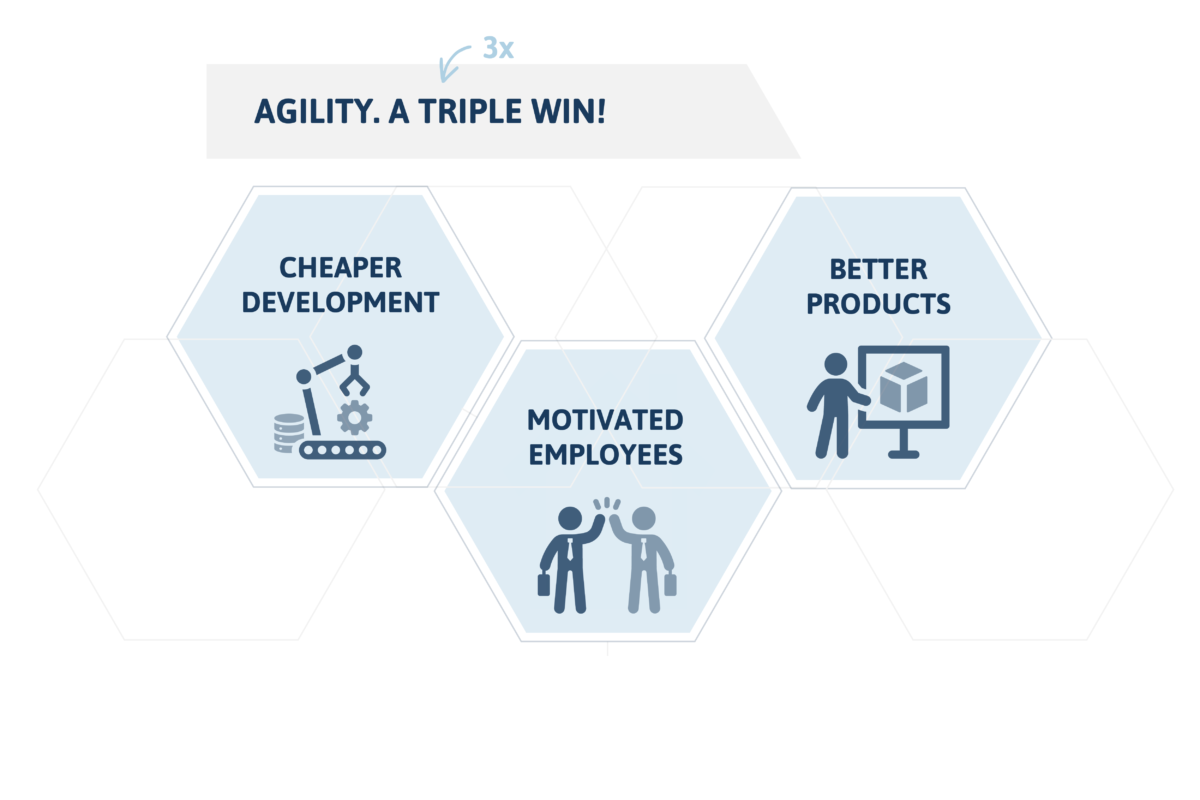Agility as the key to success in companies
To meet the challenges of a complex world openly and successfully, agile approaches are an effective, sustainable solution.
Agility means reacting quickly to change and adapting adequately and is to be understood as a process supported by the corporate culture. If agility is authentically lived in companies, it can be felt in a variety of aspects and the resulting success can be measured effectively.
Making use of agility is a triple win
The usage of agility creates a powerful strategy for organizations that deliver customer-centric products, achieve cost efficiencies and foster a motivated workforce.
Living agility in a company is a triple win that drives success from three perspectives: cheaper development, better products and more motivated employees.
Agility – a definition
Agility is the ability of a company to react quickly and reliably to events, new opportunities and rapidly changing requirements. Compared to other organizations, agile organizations align on the value to be created and allow for much more decentralized decision making instead of top-down work breakdown. These organization forms additionally allow far more self-organization and flexibility in terms of achieving goals. This has a positive effect on customers, employees and the company itself.
Advantages of agility – a triple win
Agility is a win for customers of an agile company
- Faster time to market: Customers receive ready-to-use products faster.
- Flexible adaptation: Adaptations are possible throughout the entire product development.
- Customer-centric products: Short feedback loops and direct communication ensure that products are better tailored to customer needs.
- Transparent communication: Openness and transparency towards customers are being encouraged.
- Early risk management: Risks and problems are identified and minimized already at an early stage.
Agility is a win for the company itself
- Increased efficiency: Less money is spent on developing features and products that do not meet customer needs and therefore do not generate sales.
- Competitive advantage: Earlier market entry and faster adaptation to new requirements ensure a competitive advantage.
- Customized solutions: Higher customer satisfaction and increased sales through customized products.
- Increased ROI: Faster adaptation to new market requirements increases the return on investment.
- Innovation culture: Open exchange enables innovation and new ideas.
Agility is a win for the employees
- Employees have more influence over their work, which leads to a feeling of self-determination and autonomy.
- Employee participation in the decision-making process and the opportunity to actively contribute to the team’s success increase motivation and commitment.
- Agile working methods emphasize efficiency and minimize unnecessary bureaucratic structures which makes the work process easier and increases job satisfaction.
- By providing direct feedback to improve the customer’s experience and focusing on a common goal, work is perceived as more meaningful.
- Short development cycles in agile projects enable employees to see results quicker. This contributes to the recognition of their work and a sense of achievement.
- Clear objectives and regular reviews give employees a clear overall understanding. Transparency promotes understanding of the overall process and alignment with common goals.
The EFS Consulting focus
Agility requires a good interplay between corporate culture, processes and products. Anchoring agile methods effectively in the long term will only succeed if processes, products, the corporate structure and the underlying corporate culture are considered holistically as a part of this change.
With its diverse range of services, EFS Consulting has been helping clients for many years to operate in rapidly changing markets and conditions to master the development of increasingly complex products to the satisfaction of their customers.
Agile Transformation
Agility is the ability to create value in rapidly changing, uncertain, unclear conditions.
Agile Frameworks
Scrum, SAFe, LESS, Nexus & co. - Agile frameworks offer proven approaches for complex challenges.
EFS Agility Check
The EFS Agility Check looks at the following dimensions: corporate culture, process and product in equal measure to offer a deeper understanding of the status quo of agility.
Agile Trainings & Workshops
Agile trainings create a common basis on which the next steps for a good agile transformation can be built.
Agile Organizational Development
An agile corporate culture requires consciously designed opportunities for appreciative and inspiring encounters, an open approach to mistakes and conflicts, as well as the room and time to learn and grow.
External staffing of agile roles
EFS Scrum Masters and agile coaches accelerate an effective introduction and application of agile practices and support organizational cultural transformation with brain, heart and experience.
BizDevSecOps
Cooperation between business, development, security and operations for maximum business value and minimum internal friction losses.
Agile Software Tools
Tools such as Jira, Azure DevOps and more can provide the necessary framework and know-how to master the challenges of the complex environment.
Agile Contracting
Creating fair & flexible contracts. We know the challenges related to agile projects in complex environments and accompany contract design and agile tender processes.
Agile Remote Work
The agile values serve agile teams as orientation, especially in setups that require remote work – regardless of spatial or technical design and the capabilities of the corporation.






